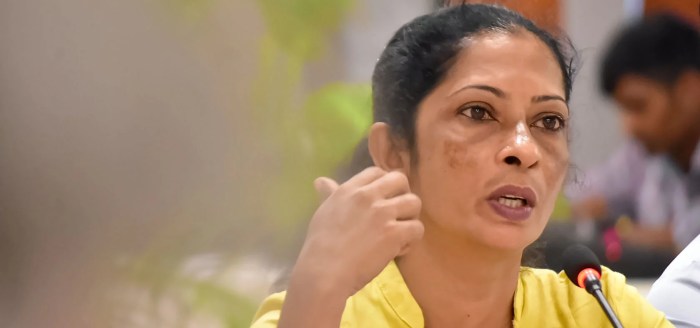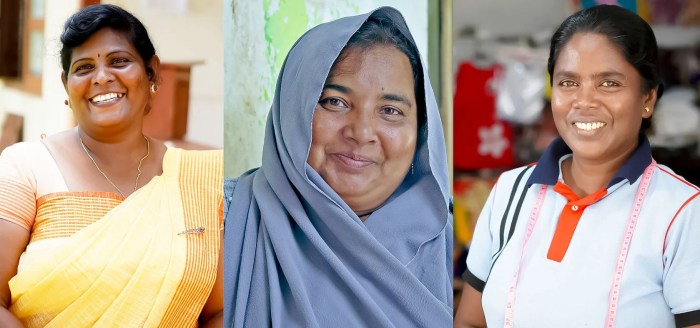Sri Lanka has more women voters than men but no female presidential candidates. This stark contrast highlights a deep-seated issue in Sri Lankan politics: the lack of female representation at the highest levels of power. While women actively participate in the electoral process, a complex interplay of social, cultural, and political factors continues to hinder their ascension to the presidency.
The island nation boasts a higher number of female voters than male voters, demonstrating women’s engagement in the democratic process. However, the absence of female presidential candidates suggests a significant gap between participation and representation. This disparity raises questions about the barriers women face in pursuing political leadership roles and the need for systemic change to ensure a more inclusive political landscape.
The Gender Gap in Sri Lankan Politics

Sri Lanka boasts a higher number of female voters than male voters, yet the political landscape remains predominantly male-dominated. This discrepancy raises questions about the factors contributing to the limited representation of women in leadership positions, particularly at the presidential level.
Examining the historical context and analyzing the underlying factors can shed light on this gender gap and potential solutions.
Historical Context of Women’s Participation in Sri Lankan Politics
The participation of women in Sri Lankan politics has a long history, with notable figures emerging as early as the 19th century. Women played active roles in the independence movement, advocating for equal rights and representation. The 1931 Donoughmore Constitution, which granted universal suffrage, paved the way for women to participate in elections.
However, despite these early milestones, women’s political participation has been uneven, with persistent challenges in achieving true equality.
Factors Contributing to Higher Female Voter Turnout
Several factors contribute to the higher number of female voters in Sri Lanka. These include:
- Increased Education and Literacy Rates:Sri Lanka has witnessed significant improvements in education and literacy rates, particularly among women. This empowerment has translated into a more engaged female electorate.
- Strong Women’s Rights Advocacy:Organizations and movements dedicated to women’s rights have played a crucial role in raising awareness and mobilizing women to participate in the political process.
- Cultural Norms and Family Influence:Traditional family structures often influence women’s voting decisions, with mothers and grandmothers encouraging younger generations to participate in elections.
Reasons for the Absence of Female Presidential Candidates
The lack of female presidential candidates in Sri Lanka is a complex issue with several contributing factors. These include:
- Patriarchal Structures and Gender Stereotypes:Deeply ingrained societal norms and expectations often limit women’s aspirations for leadership roles. These stereotypes can discourage women from seeking higher political office.
- Lack of Political Funding and Resources:Women candidates often face financial challenges in running for office, making it difficult to compete with well-funded male counterparts.
- Limited Access to Political Networks and Mentorship:Women may have limited access to the networks and mentorship opportunities that are crucial for political advancement.
- Discrimination and Harassment:Women in politics can face discrimination and harassment, which can deter them from seeking leadership positions.
Social and Cultural Influences
Sri Lanka’s social and cultural landscape significantly influences women’s participation in politics. Traditional gender roles, societal expectations, and cultural barriers create a complex web of factors that shape women’s political aspirations and opportunities.
Societal Norms and Expectations
Sri Lankan society, like many others, is shaped by traditional gender roles that often place women in domestic and caregiving roles. These expectations can limit women’s opportunities for education, professional advancement, and public engagement. The societal norm of prioritizing family and domestic responsibilities over political ambitions can discourage women from entering the political arena.
Influence of Traditional Gender Roles
Traditional gender roles often assign women the role of caregivers and homemakers, while men are expected to be breadwinners and leaders. This division of labor can limit women’s access to resources and networks that are crucial for political success. Women may face pressure from family and community to prioritize their domestic responsibilities over political aspirations.
In this topic, you find that ‘He is proud that women are dying?’: Harris blasts Trump for deadly Georgia abortion ban is very useful.
Cultural Barriers and Stereotypes
Cultural barriers and stereotypes can also hinder women’s participation in politics. There are widespread perceptions that women are less capable than men in leadership roles, especially in a political context. These stereotypes can be reinforced by the media, political parties, and even within families.
Political Party Dynamics
Political parties play a crucial role in shaping the political landscape of any nation, including Sri Lanka. Their influence extends to the participation of women in politics, with the potential to either promote or hinder their involvement. This section delves into the dynamics of political parties in Sri Lanka, examining their impact on women’s political representation.
Policies and Initiatives for Women’s Representation
Political parties in Sri Lanka have varying degrees of commitment to increasing women’s representation. Some parties have implemented policies and initiatives aimed at promoting women’s participation in politics. These initiatives may include:
- Quotas for women’s representation in party leadership positions and candidate lists.
- Training programs for women aspiring to political leadership roles.
- Financial support for women candidates.
- Public awareness campaigns to encourage women’s political participation.
However, the implementation and effectiveness of these initiatives vary widely among different parties. Some parties may only have symbolic policies, while others have more robust and comprehensive strategies. The lack of a consistent and enforced framework across all parties can limit the impact of these initiatives.
Economic and Social Factors
The economic and social landscape of Sri Lanka plays a significant role in shaping women’s political participation. This section explores the intricate relationship between women’s economic empowerment and their involvement in politics, examines the impact of social inequalities and access to resources on women’s political ambitions, and analyzes the role of education and literacy levels in influencing women’s political engagement.
Economic Empowerment and Political Participation
Economic empowerment is crucial for women’s political participation. When women have access to economic resources and opportunities, they are better positioned to participate in political processes. This is because economic independence provides women with the financial means to engage in political activities, such as campaigning, running for office, and contributing to political organizations.
“Women’s economic empowerment is essential for their political participation. When women have financial independence, they can invest in their own political careers and contribute to the political process.”
[Source
International Labour Organization]
Social Inequalities and Access to Resources
Social inequalities, such as gender discrimination, poverty, and lack of access to education and healthcare, can significantly hinder women’s political ambitions. These inequalities often create barriers to women’s participation in politics, limiting their opportunities to develop leadership skills, network with influential individuals, and access resources.
“Women from marginalized communities often face significant challenges in accessing political power due to social inequalities and lack of resources.”
[Source
United Nations Entity for Gender Equality and the Empowerment of Women (UN Women)]
Education and Literacy Levels
Education and literacy levels play a crucial role in shaping women’s political engagement. Higher levels of education and literacy are associated with increased political awareness, participation, and leadership skills. Education empowers women with the knowledge and skills necessary to understand political processes, engage in political discourse, and advocate for their interests.
“Education is a powerful tool for empowering women and promoting their political participation. It equips women with the knowledge, skills, and confidence to engage in politics.”
[Source
UNESCO]
International Comparisons
Sri Lanka’s political landscape, with its significant female voter base and lack of female presidential candidates, presents a unique situation that demands comparison with other nations to understand global trends and identify potential solutions. Examining countries with similar demographic profiles and successful initiatives implemented elsewhere can shed light on best practices and inspire strategies for promoting women’s leadership in Sri Lanka.
Global Trends in Women’s Political Participation
The global trend in women’s political participation is encouraging, albeit uneven. While women’s representation in national parliaments has steadily increased over the past few decades, significant disparities persist across regions and countries. The Inter-Parliamentary Union (IPU) reports that, as of 2023, women hold 26.5% of seats in national parliaments worldwide.
While this represents a significant increase from the 11.3% recorded in 1995, it falls short of achieving gender parity.
- Regional Variations:The representation of women in parliaments varies considerably across regions. Europe has the highest percentage of women parliamentarians (32.2%), followed by the Americas (29.7%), and Africa (24.5%). The lowest representation is found in the Arab States (18.8%) and Asia (20.2%).
- Country-Specific Examples:Countries like Rwanda (61.3%), Bolivia (53.1%), and Nicaragua (50.9%) have achieved remarkable progress in women’s political representation, showcasing the potential for significant advancements. These countries have implemented various policies and initiatives, such as quotas, to promote women’s participation in politics.
Best Practices and Successful Initiatives
Several countries have implemented successful initiatives to promote women’s leadership and increase their participation in politics. These initiatives can provide valuable insights for Sri Lanka.
- Quotas:Countries like Rwanda, Bolivia, and Mexico have adopted quota systems, requiring a certain percentage of women in elected positions. These quotas have been instrumental in increasing women’s representation in parliament and other political institutions. However, the effectiveness of quotas depends on various factors, including enforcement mechanisms and the broader political context.
- Political Party Reforms:Some countries have implemented reforms within political parties to encourage women’s participation. This includes promoting women’s leadership within party structures, providing training and mentorship programs, and adopting policies to ensure women’s fair representation in candidate selection processes. For example, the UK Labour Party has implemented a “50/50” target for women in leadership positions within the party.
- Financial Support:Providing financial support to women candidates can help level the playing field and address the financial barriers they often face. This can include funding for campaign expenses, training programs, and access to resources. Several countries have implemented programs to provide financial assistance to women candidates, particularly in developing countries.
- Public Awareness Campaigns:Raising public awareness about the importance of women’s political participation is crucial. This can be achieved through media campaigns, educational programs, and community outreach initiatives. By challenging gender stereotypes and promoting the benefits of diverse representation, these campaigns can create a more supportive environment for women in politics.
International Comparisons: Learning from Other Countries, Sri Lanka has more women voters than men but no female presidential candidates
Comparing Sri Lanka’s political landscape with other countries with similar demographic profiles reveals valuable insights and potential solutions. For instance, South Korea, with a similar population size and a relatively young democracy, has seen significant progress in women’s political participation.
South Korea has implemented a combination of quotas, party reforms, and public awareness campaigns to promote women’s leadership. Examining South Korea’s experience can offer valuable lessons for Sri Lanka.
“It is not enough to simply have women in positions of power; we need to ensure that their voices are heard and that they are able to effectively represent the needs and interests of the people they serve.”
Michelle Bachelet, former President of Chile
Recommendations for Change: Sri Lanka Has More Women Voters Than Men But No Female Presidential Candidates

Sri Lanka’s political landscape, despite having more women voters than men, faces a significant challenge in the underrepresentation of women in leadership positions. This disparity highlights the need for systemic changes to promote women’s political participation and leadership. Addressing this issue requires a multi-faceted approach, encompassing legal reforms, political party reforms, and public awareness campaigns.
Strategies for Promoting Women’s Political Leadership and Participation
Strategies for promoting women’s political leadership and participation are crucial for creating a more inclusive and representative political system. These strategies aim to empower women, break down barriers to their participation, and create an environment where women can thrive in politics.
- Quota Systems and Reserved Seats:Implementing quota systems or reserved seats for women in parliament and local councils can ensure a minimum level of women’s representation. This strategy has been successful in several countries, providing a platform for women to enter politics and gain experience.
- Political Party Reforms:Political parties play a crucial role in shaping the political landscape. Encouraging parties to adopt internal reforms that promote women’s leadership, such as gender-balanced candidate selection processes and training programs for women aspiring to leadership roles, can significantly increase women’s participation in politics.
- Mentorship and Networking Programs:Providing mentorship and networking opportunities for women in politics can equip them with the skills, knowledge, and support they need to succeed. These programs can connect aspiring women politicians with experienced leaders, fostering their growth and development.
- Financial Support:Financial constraints can often hinder women’s participation in politics. Providing financial assistance for women candidates, such as campaign funding or scholarships for political training, can level the playing field and allow women to compete effectively.
- Public Awareness Campaigns:Raising public awareness about the importance of women’s political participation is crucial. Campaigns that highlight the benefits of a more inclusive and representative political system, challenge gender stereotypes, and showcase successful women politicians can encourage greater public support for women’s leadership.
Fostering a More Inclusive and Representative Political System
Fostering a more inclusive and representative political system requires addressing the underlying social and cultural factors that hinder women’s political participation.
- Addressing Gender Stereotypes:Challenging traditional gender roles and stereotypes that limit women’s political ambitions is crucial. Public education campaigns and media representation can help break down these barriers and create a more inclusive environment for women in politics.
- Promoting Women’s Education and Economic Empowerment:Investing in women’s education and economic empowerment is essential for their political participation. Educated and financially independent women are more likely to engage in politics and challenge the status quo.
- Addressing Violence Against Women in Politics:Addressing violence against women in politics is crucial for creating a safe and conducive environment for their participation. This includes enacting strong laws against gender-based violence and providing support services for victims.
- Promoting Media Coverage of Women in Politics:Encouraging media outlets to provide balanced and positive coverage of women in politics is crucial for promoting their visibility and challenging negative stereotypes. This includes showcasing their achievements, highlighting their perspectives, and providing platforms for their voices to be heard.
Last Recap
The lack of female presidential candidates in Sri Lanka, despite a higher number of women voters, underscores the need for a critical examination of the factors that contribute to this disparity. Addressing the social, cultural, and political barriers hindering women’s political aspirations is crucial to fostering a more equitable and representative political system.
By promoting women’s leadership and participation, Sri Lanka can unlock the full potential of its diverse population and pave the way for a more inclusive and prosperous future.
FAQ Summary
Why is there a higher number of women voters in Sri Lanka?
There are various factors contributing to this, including higher literacy rates among women, increased awareness of political issues, and a growing sense of civic engagement.
What are some of the cultural barriers that women face in Sri Lankan politics?
Traditional gender roles, societal expectations, and cultural norms often limit women’s political ambitions. These barriers can include family pressure, societal expectations of women’s roles, and a lack of support from within political parties.
What are some examples of successful initiatives to promote women’s political leadership globally?
Examples include quotas for women’s representation in political parties and government, mentorship programs for aspiring female politicians, and campaigns to raise awareness about gender equality in politics.
 CentralPoint Latest News
CentralPoint Latest News


